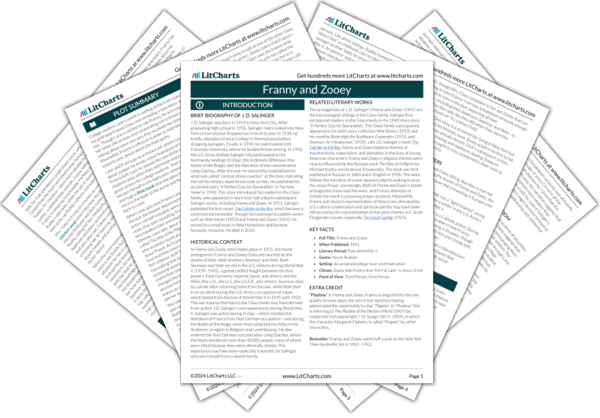Franny and Zooey implicitly argues that art ought to be beautiful—and that it can only be beautiful if it is authentic to the artist’s vision. Early in the narrative, idealistic college student Franny Glass is criticizing two poet-professors to her conventional, self-satisfied boyfriend, Lane Coutell. When Lane praises the poet-professors, Franny protests that they may produce complicated, intellectual poetry, but they aren’t “real poets” because their writing doesn’t provide readers with any beauty. Later in the narrative, Franny’s actor brother Zooey laments that Dick Hess, a scriptwriter with whom he works, produced one good work based on his authentic vision and his Iowan background, but he has since produced mediocre work because he has been inauthentically chasing script trends. Franny and Zooey’s respective complaints about bad writing—that it doesn’t attempt to be beautiful or authentic to an individual vision—implicitly suggest that there are certain requirements for good art: namely, good art must attempt to be beautiful rather than merely clever, and it must derive from the artist’s genuine, authentic vision and experiences rather than a desire to create something that aligns with fleeting cultural or artistic trends.
Art and Beauty ThemeTracker

Art and Beauty Quotes in Franny and Zooey
Lane himself lit a cigarette as the train pulled in. Then, like so many people, who, perhaps, ought to be issued only a very probational pass to meet trains, he tried to empty his face of all expression that might quite simply, perhaps even beautifully, reveal how he felt about the arriving person.
“I think the emphasis I put on why he was so neurotically attracted to the mot juste wasn’t too bad. I mean in light of what we know today. Not just psychoanalysis and all that crap, but certainly to a certain extent.”
“If you’re a poet, you do something beautiful. I mean you’re supposed to leave something beautiful after you get off the page and everything. The ones you’re talking about don’t leave a single, solitary thing beautiful.”
“I’m not afraid to compete. It’s just the opposite. Don’t you see that? I’m afraid I will compete—that’s what scares me. That’s why I quit the Theatre Department. Just because I’m so horribly conditioned to accept everybody else’s values, and just because I like applause and people to rave about me, doesn’t make it right.”
I submit that Zooey’s face was close to being a wholly beautiful face. As such, it was of course vulnerable to the same variety of glibly undaunted and usually specious evaluations that any legitimate art object is [...] But what was undiminishable, and, as already flatly suggested, a joy of a kind forever, was an authentic esprit superimposed over his entire face[.]
I can’t help thinking that you’d make a damn site better-adjusted actor if Seymour and I hadn’t thrown in the Upanishads and the Diamond Sutra and Eckhart and all our other old loves with the rest of your recommended home reading when you were small.
Have you ever seen a really beautiful production of, say, The Cherry Orchard? Don’t say you have. Nobody has. You may have seen “inspired” productions, “competent” productions, but never anything beautiful. Never one where Chekhov’s talent is matched, nuance for nuance, idiosyncrasy for idiosyncrasy, by every soul onstage.
“You want your Emily, every time she has the urge to write a poem, to just sit down and say a prayer till her nasty, egotistical urge goes away? No, of course you don’t!”
“There isn’t anyone out there who isn’t Seymour’s Fat Lady. […] And don’t you know—listen to me, now—don’t you know who that Fat Lady really is? . . . Ah, buddy. Ah, buddy. It’s Christ Himself.”











